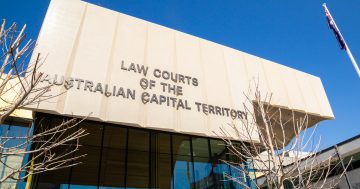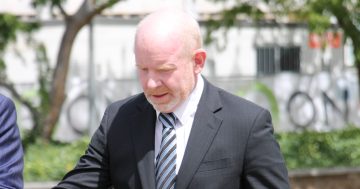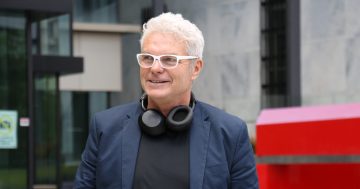
Travis Stephens leaving the ACT Courts following a previous appearance. Photo: Albert McKnight.
The discovery of a possible old brain injury has delayed the sentencing of a former Army Major who admitted he defrauded more than $90,000 from Defence.
Travis David Morgan Stephens pleaded guilty to dishonestly causing a loss and obtaining a financial advantage by deception from the department in November last year after claiming rent payments for a property he actually owned.
At Mr Stephens’ sentence hearing in the ACT Supreme Court on Friday (27 May), defence barrister Mark Dennis called for the judge’s decision to be postponed.
It came after a report from clinical psychologist Tabitha Frew, who has been treating Mr Stephens, suggested he may have previously suffered a traumatic brain injury that warranted further investigation.
Mr Dennis said Mr Stephens had scheduled an interview with a neuropsychologist to investigate this possibility.
“I understand this is assessed in three steps,” Mr Dennis said.
“The neuropsychologist will run tests and write a report, then Mr Stephens would need to have a brain scan, and then [both these results] are sent to a neuropsychiatrist.”
It was unclear when a neuropsychiatrist would be able to complete an examination of the results as Mr Dennis said such professionals are “not in great supply”.
Justice David Mossop agreed such a finding could impact his sentencing decision.
“[The brain injury] may be nothing, but it might be significant,” he said.
Ms Frew was questioned as part of the sentencing hearing in the Supreme Court. She had been treating Mr Stephens since 2019 in a therapeutic capacity and had not undertaken a forensic evaluation of Mr Stephens.
She had diagnosed Mr Stephens with autism spectrum disorder (ASD) and attention deficit hyperactivity disorder (ADHD).
When questioned by the Crown prosecutor about how such disorders could impact on Mr Stephens’ offending, Ms Frew stressed she could not “speak to his state of mind at the time of the offending”.
However, she said she had “observed a number of times” Mr Stephens had difficulties “mentally placing himself in the shoes of another person” and appreciating another person’s perspective.
She cited an example where she had to stress to Mr Stephens he needed to privately pay for his treatment sessions, which had previously been handled by Defence before he was discharged.
“It took about six to seven discussions and I had to write down the information before Mr Stephens could recall [we had had] the discussion and pay the fee,” Ms Frew said.
She also said Mr Stephens’ ability to fill in forms and complete worksheets was compromised.
“[He would] often make careless mistakes,” Ms Frew said.
Retired Lieutenant Colonel Kyle Tyrrell provided a character reference for Mr Stephens and was also questioned during the hearing.
Crown prosecutor Mr Hassall asked how Mr Tyrrell could say Mr Stephens was a man with “faultless integrity” in light of his guilty plea.
“My summation of him has been taken over 18 years … not just over the subject of this proceeding,” Mr Tyrrell replied.
The Crown argued Mr Stephens “knew exactly what he was doing” when he defrauded Defence by claiming rent assistance payments on a property he in fact owned.
While Mr Stephens has now paid back all the money taken, Mr Hassall did not show he had any remorse over his offending.
Mr Hassall said Mr Stephens had a “cavalier attitude of entitlement” during his “repeated episodes of dishonesty over a lengthy period”.
While he did not challenge Ms Frew’s diagnoses, Mr Hassall argued they were “recent [diagnoses] and entirely post-dated” the offences.
“There is a disconnect between the ‘highly capable’ person [described in the character references] and the ‘highly dysfunctional’ person described in Ms Frew’s report,” he said.
Mr Hassall also asked the Justice not to place too much weight on Mr Stephens’ guilty plea, as in his opinion it was “nothing more the recognition of the inevitable … made late in the piece”.
As for the defence, barrister Mark Dennis called Mr Stephens’ fraud scheme an “exceptionally unsophisticated effort”.
He said while he did not want to blame or be seen to blame the ADF, he argued there “seems to be very little, if any, risk protocol to prevent this type of offending”.
“In cases of other forms of revenue fraud … secrecy provisions would make cross-checking quite difficult,” Mr Dennis said.
“A simple search of bona fides would have revealed [Mr Stephens] was co-owner [of the property].”
He also argued the seriousness of the offending was lessened as Mr Stephens was not in a “special position of trust” in the community.
“He’s essentially a rank-and-file member of the Australian Defence Force,” Mr Dennis said.
He described Mr Stephens’ offending as “out of character”, despite the length of the fraud.
Justice Mossop adjourned the matter to 2 June.





















Considering the deficit Labor have racked up, it’s a wonder why we even pay tax for this mob to… View